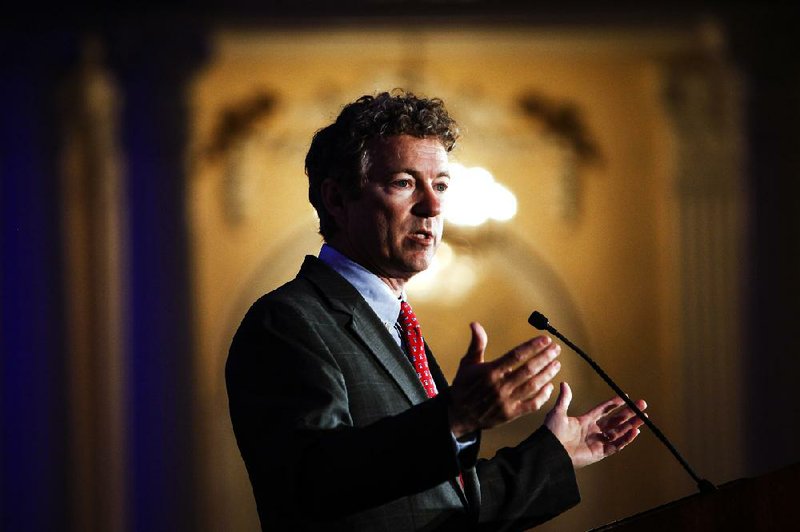MEMPHIS -- The Republican National Committee on Friday took steps to end free-for-all presidential debates and vowed to punish potential contenders who participate in rogue forums.
At the same time, an independent organization with deep ties to the conservative Koch brothers will spend $125 million on the battle for control of the Senate this fall, giving the 168-member central party meeting a stark reminder that outside groups will have significant sway over Republican political fortunes through the 2016 presidential race.
"At the RNC, we cannot control everything in politics. But we have an important mission, and we're going to get the job done," committee Chairman Reince Priebus said as he opened the party's meeting Friday.
As he spoke, reports circulated that Americans for Prosperity plans to escalate its television advertising across the nation, improve voter-data collection and strengthen its 31-state ground operation.
A senior official with direct knowledge of Americans for Prosperity's plans confirmed the election blueprint, outlined in a memo distributed to Republican donors this spring. The official confirmed the memo's authenticity but wasn't authorized to publicly discuss its contents.
Industrialist billionaires Charles and David Koch have funneled millions of dollars to conservative causes. Democrats including Senate Majority Leader Harry Reid of Nevada have criticized the billionaires and claim Republican policies are being dictated by an agenda to grow the Kochs' wealth.
In a nod to the Kochs' heft, the Republican National Committee passed a resolution condemning Reid for what it called "hyperbolic attacks ... on private citizens."
The struggle to mend a party split between populist and establishment factions has hung over the meeting in Memphis, with committee officials looking for ways to make it harder for weak but vocal candidates to prolong nomination fights, roil debates and jeopardize the party's chances -- again -- of winning the Senate majority and the presidency.
Sen. Rand Paul, a Kentucky Republican and anti-establishment candidate, used his spot at a Republican National Committee luncheon to urge members to rethink policies on national security and drug prosecutions.
Paul also criticized potential Democratic rival Hillary Rodham Clinton's tenure as secretary of state, during which attacks on a U.S. post in Benghazi, Libya, left four Americans dead in 2012. House Republicans this week announced a select committee that will again investigate the attacks.
"Hillary Clinton has precluded herself from ever being considered for that position," Paul said, referring to a possible presidential run by Clinton.
On Thursday, the Republican National Committee rules panel endorsed the creation of a 13-person committee that would limit how many presidential debates can take place and who can ask the questions. The full committee Friday went along with that plan to ban candidates who participate in scofflaw debates from future committee-backed sessions by a 152-7 vote.
Several committee members said they were worried activists might see their ability to prod candidates reduced under the new rule.
"You're going to squelch the ability of candidates to get to know their voter base, and the voter base to get to know their candidates," said Diana Orrock, a national committee member from Nevada. "As a voter ... I want to see the good, the bad and the ugly."
The committee measure affects only debates as candidates vie for the GOP nomination. The bipartisan Commission on Presidential Debates will still have final say on the debates between the Republican and Democratic nominees during the general election campaign.
But the Republican National Committee recommendation did take a step at reining the haphazard debate style that characterized the 2012 selection progress. The system provided a seemingly endless series of debates, from which former Massachusetts Gov. Mitt Romney emerged as the party's nominee after weathering harsh criticism from his rivals.
"Spending too much time fighting with each other distracts the party from its ultimate goal, which is winning the presidency," said Bruce Ash, chairman of the Republican National Committee's rules committee. Others said the debate moderators during the 2012 campaign were hostile to the GOP.
Meanwhile, political operatives said Americans for Prosperity's $125 million investment does not include as much as $30 million more that the group's sister nonprofit organization expects to spend on voter education efforts, which are designed to support conservative causes but don't necessarily advocate for specific legislation or candidates.
The senior official with knowledge of the memo, first reported by Politico, said the group has already spent more than $20 million this year ahead of the November midterm elections.
A Section on 05/10/2014

